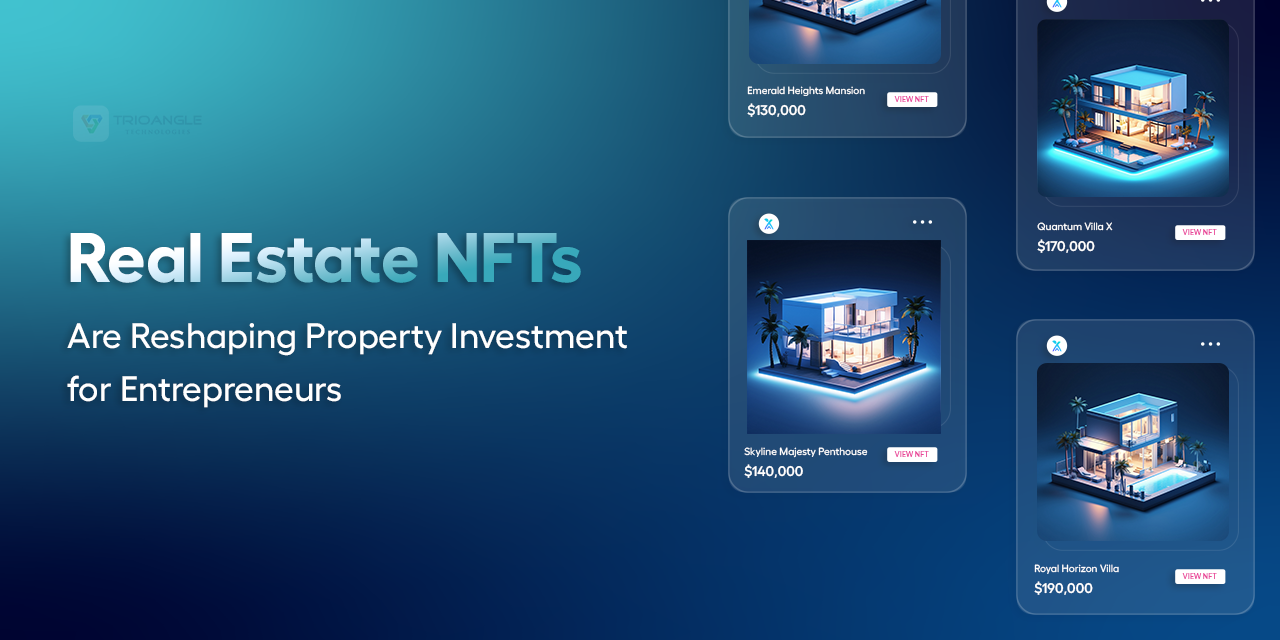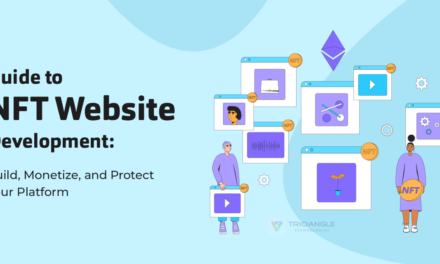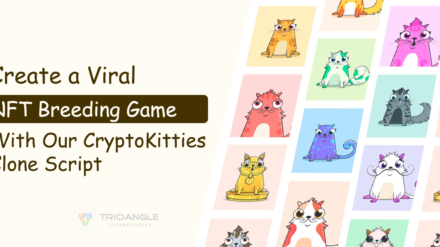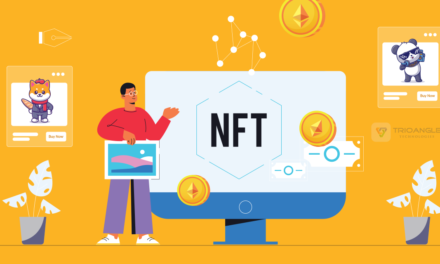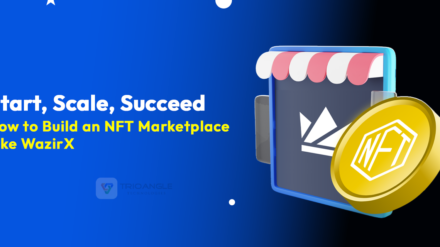Real estate NFT Marketplace Development is getting a digital makeover. With the rise of blockchain and NFTs, buying, selling, and owning property is entering a new era. Entrepreneurs are at the center of this shift. Real estate NFTs allow people to buy, sell, and manage property on the blockchain. It’s a real-world application that brings speed, transparency, and global access to a slow-moving industry.
In this blog, we’ll talk about how to Create Real Estate NFT Marketplace platform to what entrepreneurs need to know to get started. You’ll learn about tokenized real estate, blockchain property ownership, smart contracts,… and how to create or invest in an NFT real estate marketplace. Whether you’re a beginner or already exploring the space, this guide will give you the edge.
How Real Estate Assets Are Tokenized Into NFTs
Tokenizing real estate means turning a physical property into a digital token. This token is called an NFT… It represents ownership or shares in the property.
Here’s how the process works:
#1 Create a Legal Entity:
Start by placing the property under a legal entity like an LLC or SPV (Special Purpose Vehicle). This creates a digital boundary between the asset and its ownership structure.
#2 Mint the NFT:
The ownership of the legal entity is linked to an NFT. That NFT now represents ownership of the property.
#3 Integrate Smart Contracts:
Critical data—ownership, transaction rules, maintenance logs—are embedded into smart contracts.
#4 Use IPFS for Document Storage:
Legal contracts, property images, and inspection reports are stored securely and off-chain.
#5 Add Oracles:
Real-world data like price indexes or property tax status are synced to the blockchain for validation.
#6 Tokenization Models:
Full Ownership: A single NFT represents an entire property. Ideal for luxury estates or individual buyers.
Fractional Ownership: Property is split into many NFTs, each representing a share. Great for group investments.
Entrepreneurs use this setup to let people buy real estate NFTs. Some projects tokenize fractions of a property. This enables shared ownership and allows small investors to enter the market. Tokenized real estate is a new way to raise capital and trade property globally.
Choosing the Right Blockchain and ERC Standards for Real Estate NFTs
Choosing the right blockchain is key to Real Estate NFT Marketplace Development. It affects transaction speed, cost, scalability, legal compliance, and future integrations.
Best Blockchains for NFT Real Estate Marketplace:
- Ethereum: Known for security, decentralization, and rich developer tooling. It’s the most battle-tested chain. But high gas fees can be a barrier for frequent or low-value transactions.
- Polygon: Acts as a faster, cheaper layer-2 solution for Ethereum. It’s perfect for platforms that want Ethereum’s security. But with scalability and user-friendly economics.
- Avalanche: Offers customizable subnets, enabling region-specific or private real estate ecosystems. Avalanche’s consensus mechanism makes it highly scalable without compromising decentralization.
- Private Blockchains: Useful for enterprise applications… where data privacy, permissioned access, or governmental integrations are critical. Think of government land registries or large real estate consortiums.
Understanding Real Estate NFTs ERC Standards (Token Types):
Token standards define how real estate NFTs behave on the blockchain. Choosing the right standard ensures your NFT functions correctly. Whether it’s for full ownership, fractional investment, or rental access.
#ERC-721: This standard is used for unique, unique assets. In real estate nfts, it represents full ownership of a property. Perfect for individual homes or commercial buildings that won’t be split.
#ERC-1155: A multi-token standard that supports both unique and shareable assets. It’s ideal for fractional ownership. Where one property is divided among several investors. Each investor holds a piece of the same asset.
#ERC-4907: Designed for rental and leasing. It adds a special “user” role with an end date. Great for short-term rentals or timeshares. Once the rental period ends, access is automatically revoked.
#ERC-3643 (T-REX): A compliance-focused standard used when real estate NFTs must follow financial laws. It supports features like investor verification and transfer restrictions. often required for regulated markets.
#ERC-1400: Built for security tokens. Useful when property NFTs are treated like shares. It helps with identity checks, dividends, and voting rights.
Picking the correct token standard ensures your real estate NFTs are legally defensible… technically efficient, and aligned with business needs.
Think of this as choosing the building blocks for your NFT property marketplace. Choose based on your business goals residential, commercial, fractional, or full transfer.
Building Utility: Rental Income, Governance & DeFi Integration
Real estate NFT Marketplace Development aren’t just digital representation of land or buildings. Their value grows when tied to meaningful utilities. That generates returns or expand functionality.
#1 Rental Income with Smart Contracts
- When an NFT is linked to a rented property. Smart contracts automate monthly rent collection and instantly distribute earnings to NFT holders. These contracts remove the need for landlords or property managers.
- This turns NFTs into income-generating assets. Entrepreneurs can build platforms where passive investors earn real-world cash flows without intermediaries.
#2 Governance Through DAO Models
- Real Estate NFTs holders can make decisions together. Through Decentralized Autonomous Organizations (DAOs), owners vote on key choices. Renovations, tenant approvals, or rent updates.
- Voting happens on blockchain tools like Aragon or Snapshot. Each NFT represents voting power, often based on how much of the property you own.
- Benefits: Enhances community trust, reduces disputes, and decentralizes operational control.
#3 DeFi Integration
Real estate NFTs can also be used in the DeFi (Decentralized Finance) world.
- Collateralization:
NFT holders can use their real estate tokens as collateral to borrow crypto, like how mortgages work. - Staking: Lock the NFT in a smart contract to earn extra yield.
- Liquidity Pools:
Tokenized real estate shares can be added to DeFi pools. It provides instant liquidity in otherwise illiquid markets. - Indexing: Many properties can be bundled into a real estate NFT index fund and traded like ETFs.
#4 Lifestyle & Access Utility
Real estate NFTs can offer real-world perks too. Think of it as a digital key. You might use your NFT to unlock smart doors, access a co-working space, or enjoy membership-only amenities like a gym, club, or lounge. This turns property into an experience, blending utility with exclusivity.
Utility makes the NFT more than a paper deed. It’s a financial, governance, and lifestyle asset rolled into one.
Legal Compliance, KYC, and Global Jurisdiction Challenges
Property laws differ across countries. That’s why legal compliance is a core part of NFT real estate marketplace development.
#1 Property-Backed Proof and Legal Wrapping
Legal Wrapping: Entrepreneurs must link each NFT to a legally recognized asset. This usually means creating an LLC to hold the title deed, and then linking that LLC to the NFT.
How It Works:
- Property is transferred to a legal entity.
- NFT minted on the blockchain represents ownership of that entity.
- Ownership transfers via NFT must trigger a real-world ownership transfer. (manually via a notary or automatically via smart contract + custodial API).
- If not legally wrapped, the NFT may be considered a mere receipt or collectible. Not enforceable ownership. This opens you to lawsuits or nullified transactions.
Some regions already support real estate tokenization. In the U.S., platforms must comply with SEC rules. Europe has clearer digital asset laws. The UAE is pushing innovation with sandbox programs.
Know your local laws or partner with legal experts.
#2 KYC/AML Compliance Layer
Almost every jurisdiction requires some form of KYC (Know Your Customer). And AML (Anti-Money Laundering) procedures for real estate nfts transactions. Failure to comply can halt your platform or attract penalties.
How to Implement:
- Partner with KYC providers like Jumio, Onfido, or Persona.
- Store identity data securely, with end-to-end encryption.
- Tier access levels (e.g., verified investors vs. general users) based on geographic and financial regulations.
- Use ERC-3643 tokens for this… they support permissioned access.
- Compliance adds user trust and unlocks institutional interest. Skipping this step may get you banned from major jurisdiction.
You’ll also need licensing. Depending on your location, this could include broker licenses, securities clearance, and property registration.
Entrepreneurs building NFT property marketplaces must work with legal teams from day one. One mistake could lead to a ban, lawsuit, or loss of investor trust.
#3 Navigating Jurisdictional Complexity
U.S. Regulations:
- Treating Fractional NFTs as securities. Meaning you need SEC approval, investor disclosures, and licensed operations.
- Some states also require local registration for land transfers.
European Union:
The MiCA framework regulates crypto assets but provides clearer guidelines for asset-backed NFTs.
GDPR adds another layer: your user data handling must be fully privacy-compliant.
Asia & MENA:
- Countries like Singapore, UAE, and Bahrain are ahead in providing NFT-friendly sandboxes.
- Their licensing process is smoother but still demands KYC. Legal backing, and documented asset provenance.
- Smart Contracts Must Adapt: Build modular, jurisdiction-aware contracts. that trigger different flows based on user country or asset location.
Tech Stack and Launch Roadmap for Real Estate NFT Platforms
Now that legal and functional aspects are clear, it’s time to build. Real estate NFT platforms demand robust tech architecture. Combining blockchain logic, legal workflows, and user-friendly interfaces.
You need the right tech stack. Start with:
#1 Blockchain Layer:
- Ethereum: High trust, but higher gas fees—best for luxury or high-value assets.
- Polygon: Ideal for frequent transactions and fractional investments.
- Avalanche/Subnets: Useful when creating jurisdiction-specific platforms with custom rules.
#2 Smart Contracts:
- Written in Solidity (for EVM chains).
- Use verified contracts for minting, rental, royalties, and DAO logic.
#3 Frontend Framework:
- React.js or Vue.js for responsive, modern UIs.
Mobile-friendly, with wallet connection via Web3Modal, MetaMask, or WalletConnect.
#4 Backend Services:
- Node.js + Ethers.js or Web3.js for interacting with smart contracts.
Optional GraphQL APIs for efficient data querying.
#5 Storage Layer:
- IPFS or Arweave for decentralized document storage.
Includes deeds, KYC documents, maintenance logs.
#6 Compliance Layer:
- API integrations with KYC providers.
Dynamic smart contracts that trigger different logic based on verified identity.
#7 Wallet Integration: Support MetaMask, Coinbase Wallet, or fiat-to-crypto.
Start simple. Build a test platform with 1-2 properties. Test ownership transfer, rent payment, resale, and KYC.
Scale slowly. Add features like fractional ownership, voting, and staking later. If you’re targeting global users, add language and currency options.
Real Estate NFTs Aren’t a Trend…They’re Infrastructure
We’re not just looking at digital tokens… We’re looking at the future of real estate NFT Marketplace Development .
Real estate NFTs can simplify ownership, open markets, and create global liquidity. Entrepreneurs who understand this shift now will lead the next generation of real estate platforms.
From choosing the right blockchain to ensuring compliance and building utility. Each step you take defines how your platform grows.
The opportunity? Massive.
The catch? You need the right vision and the right team.
That’s where Trioangle comes in.
With years of experience in Real Estate NFT marketplace development. Trioangle helps startups and enterprises build custom, secure, and scalable real estate NFT platforms.
Whether it’s fractional ownership, rental integrations, or DeFi tools, Trioangle brings your idea to life fast and future-ready.
If you’re ready to reshape how people buy, sell, and invest in property. It is time to create Real Estate NFT Marketplace platform.
The next property revolution is on-chain. Be the one who builds it with Trioangle.

